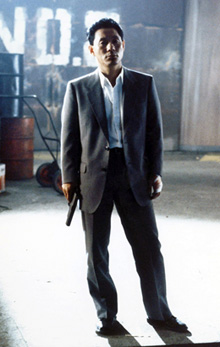 I watched "Beat" Takeshi Kitano's directorial debut Violent Cop (1989) again after many years, and was amazed by how much better it was than I'd remembered. The first Beat Takeshi film I ever saw was Sonatine (1993), and I, along with many an unfortunate yakuza in that film, was completely blown away. I saw Violent Cop soon afterward, and the difference in style caused me to regard it an inferior early work; indeed, in contradistinction to the refinement, the existential stillness and Kubrickian pacing of Sonatine, Violent Cop seemed somehow tawdry and base. But I was hasty in my judgment. Now, after years and hundreds of Japanese films (including a few more from Kitano), I can say that Violent Cop is a terrific film that stands on its own merits. It is also a tribute to Kitano's abilities as a fledgling director, stepping in as he did when the original director, Kinji Fukasaku, stepped out due to scheduling conflicts (the two finally worked together a decade later on the mind-bendingly bloody ballet that is Battle Royale).
I watched "Beat" Takeshi Kitano's directorial debut Violent Cop (1989) again after many years, and was amazed by how much better it was than I'd remembered. The first Beat Takeshi film I ever saw was Sonatine (1993), and I, along with many an unfortunate yakuza in that film, was completely blown away. I saw Violent Cop soon afterward, and the difference in style caused me to regard it an inferior early work; indeed, in contradistinction to the refinement, the existential stillness and Kubrickian pacing of Sonatine, Violent Cop seemed somehow tawdry and base. But I was hasty in my judgment. Now, after years and hundreds of Japanese films (including a few more from Kitano), I can say that Violent Cop is a terrific film that stands on its own merits. It is also a tribute to Kitano's abilities as a fledgling director, stepping in as he did when the original director, Kinji Fukasaku, stepped out due to scheduling conflicts (the two finally worked together a decade later on the mind-bendingly bloody ballet that is Battle Royale).Returning to Violent Cop was like finding the source of a river; from here would flow and expand various themes and recurring imagery in subsequent features, such as the long take on the stone face, the sudden, unexpected bursts of punishing brutality, and Kitano's enigmatic film presence itself -- stoic, unpredictable, and immovable as a mountain. After Fukasaku's departure, Takeshi extensively rewrote the shooting script for Violent Cop, making it his own. For example, he added long sequences of himself walking (another recurring image in his films), his hurried, bowl-legged stride somehow menacing when colored by his character's explosive physical assaultiveness. When an interviewer later asked about the prevalence of walking sequences in his films, Kitano reportedly joked, "Because that's part of the TV cop show formula." Really, it's a way of communicating the energy of the central character; compare the walking shots of Lee Marvin as Walker in John Boorman's Point Blank (1967). Other recurring Kitano film elements include the aforementioned existential calm at the heart of the maelstrom and the appearance of a gay character, not exactly a commonplace in Japanese film.
Now I think I'll move forward from Violent Cop through the rest of Takeshi Kitano's filmography, in chronological order, to follow the development of his filmmaking style through the 90s to the point when his films start to falter in the early 2000s.


No comments:
Post a Comment